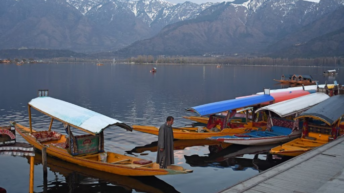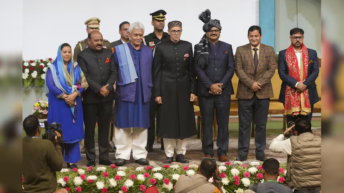|
Listen to article
Getting your Trinity Audio player ready...
|

The Israel-Palestine Quagmire
Ever since 1951 Israel celebrates Remembrance Day or Yom Hazikaron on 4 Iyar as per the Hebrew Calendar, that falls during April-May, for the fallen soldiers who were martyred in Palestine War 1947-1949 also known as Israel’s War of Independence. In 1963 it was decided that Yom Hazikaron is also meant to remember civilian victims along with the fallen soldiers and therefore, the day is celebrated as “Memorial Day for the Fallen Soldiers of the Wars of Israel and Victims of Actions of Terrorism”.
Yom Hazikaron is a day of collective and personal anguish mingled with honour for the fallen. In Hebrew calendar system, a day begins at sunset and the official events on Yom Hazikaron day begin at 8.00 PM with a one-minute-siren heard all over the country. When the siren is heard, Israelis stop everything and stand in silence.
In 2021, Yom Hazikaron begins on the evening of 13 April. The date was significant for Muslims across the world as well because it was the first day of the holy month of Ramadan. Muslim observe Ramadan as a commemoration of Prophet Muhammad’s first revelation, which is also considered as one of the Five Pillars of Islam [the Five Pillars are – Shahada (Professor of Faith); Salah (Prayer); Zakat (Almsgiving); Sawm (Fasting); and Hajj (Pilgrimage)].
Jerusalem’s Al Aqsa Mosque, which was built on top of Temple Mount known as Haram esh-Sharif, is located in close proximity to historical sites significant in Judaism, most notably the site of the Second Temple, the holiest shrine of Judaism. Owing to this, the area has been a flashpoint in Israeli-Palestinian conflict.
On 13 April 2021, the Israeli President Reuven Rivlin was supposed to deliver a speech at the Western Wall, a sacred Jewish vestige situated just below the Al Aqsa Mosque. Israeli police were concerned that sounds from loudspeakers that broadcast prayers to the faithful from the four minarets of Al Aqsa Mosque would drown the Israeli President’s speech and jeopardize Yom Hazikaron celebration. The mosque leadership had rejected an Israeli request on 12 April to avoid broadcasting prayers during the speech.
Therefore, on the night of 12 April, a group of Israeli police officers entered the Al Aqsa Mosque and cut the cables to the loudspeakers. This action triggered the eruption of Israeli-Palestine conflict of 2021. Since 2005, Palestine’s West Bank has been ruled by Mahmoud Abbas led Fatah while the militant group Hamas has been ruling the Gaza Strip since 2007.
After the loudspeaker incident of 13 April, beginning 15 April, Hamas started intermittent yet indiscriminate rocket fire on Israel. The forced evictions of 6 Arab families in favour of Israeli settlers in the contested neighbourhood of Sheikh Jarrah where a secretive Jewish group claims historical rights to the land also sparked sporadic violence in May 2021. Israel claimed that 1950 Absentees’ Property Law allows the Israeli state to confiscate properties owned by people who live on enemy land. On 10 May 2021 the Israeli Supreme Court was set to decide whether to uphold the eviction but the violence forced the Attorney General to request delay the judgment for a month. Formal full-blown rocket fire from Gaza started on 9 May. Deployed since 2011, the mythical Iron Dome mobile all-weather air defence system, developed jointly by Israel’s indigenous Rafael Advanced Defense System and Aerospace Industries, has intercepted and destroyed 90 percent of incoming rockets fired from Gaza.
Tracing the Genesis of Israel-Palestine Conflict
More than 70 years have passed since Israel came into existence yet except for Egypt and Jordan, none of the other neighbours that include Lebanon, Syria, and Palestine ever recognized its border. The territory, which became Israel, used to be part of the Turkish Ottoman Empire until the end of World War I. Britain got the mandate of the region with a pledge to establish ‘a national home for the Jewish people’ in Palestine, contradicting Whitehall’s commitment to support the foundation of a liberated Arab state under Hashmite rule in the Near East. Unable to resolve the dispute between the rival claimants, Britain handed over the problem to the United Nations and in 1947, the UN recommended partitioning Palestine into two states – one Jewish, one Arab – with the Jerusalem-Bethlehem area to become an international city. Jewish long-time residents and zionist settlers accepted the plan but Arab leaders rejected it.
Plan mooted by the UN in 1947 for Settlement of Palestine


Tired of the opposition from Palestinian Arabs, Jews declared the formation of Israel and its independence on 14 May 1948. Five Arab nations – Palestine, Lebanon, Syria, Iraq, and Egypt joined the fight against Israel but after some time, Israel managed to take the offensive and win. In February 1949, agreements between Israel and the neighbouring states of Egypt, Lebanon, Transjordan, and Syria, these bordering nations agreed to formal armistice lines. The Gaza Strip was under Egyptian control while Jordan controlled the West Bank until 1967.
The Armistice Line of 1949


During the six-day war of 1967, Israel crippled Egyptian, Jordanian and Syrian militaries. The three countries lost 20,000 troops while Israel lost less than 1000 troops in the conflict. Afterwards, Israel occupied the Sinai Peninsula, the West Bank, the Golan Heights, East Jerusalem and the Gaza Strip.
Changed Map since the 1967 Six-Day War


In 1979, Egypt recognized Israel and agreed to settle the border. In return Israel handed over the Sinai Peninsula but continued to assert control on East Jerusalem, Gaza and Golan Heights.
Present Map of Israel’s Boundary


(All Maps Credit: BBC)
Jordan recognized Israel and settled its border in 1994. Without a formal agreement, Lebanon agreed to the 1949 armistice line as the de facto northern border of Israel. Syria is still to settle her border with Israel. The status of the West Bank, East Jerusalem and Gaza are still to be negotiated.
India’s Ambivalence
From the beginning, India followed a skewed policy on Israel. Mahatma Gandhi and Jawaharlal Nehru sided with the Arabs outright. India opposed the 1947 plan of partitioning Palestine and voted against Israel’s admission to the UN in 1949. Nehru delayed recognition of Israel until 17 September 1950 because of his ‘desire not to offend the sentiments of Arab countries’. Despite the recognition and despite Israel’s opening a consulate in Bombay in 1953, India refused to open full diplomatic relations until 1992. Fear of losing the Muslim vote by Indian politicians was the primary driver of the policy which led to a consistent pro-Palestine stand. In a landmark departure, Narendra Modi became the first Indian prime minister to visit Israel in 2017.
Presently India is a non-permanent member of the UN Security Council. India lost a national named Soumya Santhosh, who was killed in Hamas’ rocket fire in Israel’s Ashkelon. In the UNSC meeting on Israel-Palestine held on 16 May, India condemned the rocket fired from Gaza. It was a significant departure from past statements. While India sought de-escalation of the conflict, it termed Israel’s fire as ‘retaliatory’. However, India reaffirmed its support for the ‘just Palestinian’ cause and invoked her relations with Jerusalem, where an Indian hospice house is tied to the memory of Sufi Saint Baba Farid, a spiritual master of the Sikhs as well.
A ceasefire was brokered by Egypt between Israel and Hamas, which came into force at 2 AM on 21 May. Since 9 May, Hamas fired 4,350 rockets into Israel that killed one Israeli soldier and 12 civilians while Israel’s aerial bombings and artillery fire into densely populated urban areas killed more than 230 Gazan citizens including 25 senior Hamas leaders and many women and children. After the 11-day fight, both Israel and Hamas claimed victory. It remains to be seen if the ceasefire holds or not under a new Israeli coalition government.






Add comment